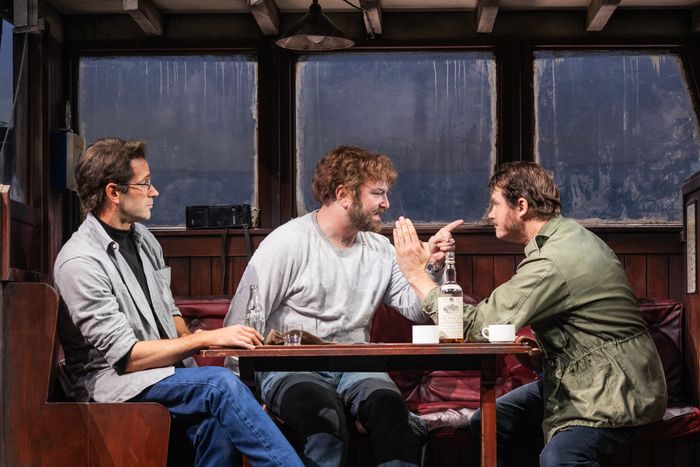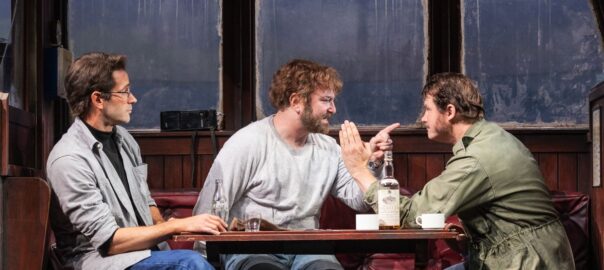[ad_1]

You should probably come into The Shark Is Broken knowing your lore. The play is set during the infamously troubled production of Jaws, the 1975 Steven Spielberg shark film that helped birth the modern blockbuster but seemed potentially dead in the water as it was being made. As you’ll at least infer from the title, the big mechanical prop fish kept breaking down during production, a problem compounded by the fact that Spielberg had chosen to shoot in open water off Martha’s Vineyard. From there, you get the play’s Beckett-esque premise: The leads, Roy Scheider (Colin Donnell), Richard Dreyfuss (Alex Brightman), and Robert Shaw (Ian Shaw, his son, who co-wrote the script with Joseph Nixon), are all stuck on a boat, waiting for endless hours between takes, at the mercy of the new god of modern filmmaking—special effects. Shall we go? Well, not until someone fixes Bruce the Shark’s pneumatic innards.
Although the play is situated on that boat, the problem quickly becomes that it’s really about everything that happens after Jaws is released, which is where the lore comes in. Shaw and Nixon’s script leans heavily on your assumed awareness of what would soon happen when Spielberg’s event movies devour the New Hollywood experimentation of the 1970s and lead us right to our current cinematic universe. So there are awkward, audience-pandering jokes wherein Shaw says, “UFOs! Aliens! Jesus! Whatever next? Dinosaurs?” and you think about Jurassic Park, or when Scheider insists he’ll never do a sequel to Jaws, and you recall that he was roped, unhappily, into one.
That extra-textural dramatic irony gnaws at The Shark Is Broken, which has less integrity as a play than as a thoroughly researched dress-up presentation for a history-of-film class. Ian Shaw, no great surprise, strongly resembles his father, and Brightman and Donnell have both been made up into ringers for Dreyfuss and Scheider. (Praise to Duncan Henderson’s costumes and to the wigs by Campbell Young Associates.) Everyone is meticulously re-creating those familiar voices — Brightman in particular zips right through Dreyfuss’s manic, cokie rants with gusto — and acting out his character’s well-known on-set habits. But although the actors are raring to go, the staging is cramped, with director Guy Masterson running out of ways to shuffle them around a boat that, yes, we know, is quite claustrophobic. (That’s surely the intent, but it makes the play seem smaller than it should.) More pressingly, the writing, intent on remaining lightly comic and knowing, keeps delivering what is familiar and unchallenging. Donnell, in a nod to Scheider’s love of tanning, strips down in an awkwardly staged moment to sunbathe, drawing titters from the audience, a gesture where fan service and beefcake collide.
The heart of the thing lies in Ian Shaw’s playing his father. Robert Shaw was an accomplished writer (friends with Harold Pinter, as the play will remind you) as well as a grand stage actor, one who would not be pleased by having a shark movie lead off his obituary. Ian doesn’t pull back from the intensity of his outbursts at Dreyfuss for goofing around too much, all part of their very well-documented feud. There’s a lot for Ian to explore in his father’s conflicted feelings about working in Hollywood, as well as his alcoholism. But as with so much of The Shark Is Broken, the exploration doesn’t go especially deep. It’s poignant to see son-as-father grumble about the cost of having to support his nine children, one of whom is delivering the lines, but the script pulls away from spending too long in discomfort. In fact, it follows up Shaw’s line about his kids by having Scheider joke about how he’s “gonna need a bigger boat.”
Fathers end up being The Shark Is Broken’s primary way into its whole central trio. Eventually, sitting in that little boat onstage, everyone gets around to talking about their dads: Scheider’s was violent; Dreyfuss’s wanted him to be a lawyer; Shaw’s was a “real alcoholic, not just a barroom brawler or a dilettante drinker.” The scene in the latter half of the one act where the three of them start to open up about their fathers hits at something emotionally where the rest of the play tends to be too stuffed with trivia. (It also consciously echoes the late-night bonding session from the movie, where Shaw’s and Dreyfuss’s characters compare scars.) It’s where the actors’ performances cool off from nervous, meticulous imitation into a truer dynamic.
That dynamic is as least as old as Greek mythology, and here the father issues also mirror a war between media: films swallowing theater, then being swallowed by even bigger films. (As all these guys try to get past their own dads, they’re making something big and different that will be the new artistic order their children live under.) The Shark Is Broken chases the Oedipal cycle back to the stage, but it doesn’t succeed in usurping the tendencies of the movies. You might hear a lot about the dispiriting path that Hollywood would soon head down after the release of Jaws, but The Shark Is Broken is still in (justifiable) awe of the film itself. Like Back to the Future: The Musical, which just opened a few blocks away, The Shark Is Broken depends on your own affection for the property to make sense. Onstage, the actors, sitting in their little cabin cruiser, are surrounded by a giant semi-cylindrical screen on which we see footage of the ocean and sky around them. Intentionally or not, it resembles the big, empty “volume” stages where screen actors now perform toward emptiness that will be filled in by vast amounts of CGI — you feel the next weightless and craven generation of franchise movies after the Spielberg blockbusters creeping into view. That big, half-open screen also resembles a giant maw, one that threatens to gape even wider and swallow the theater whole.
The Shark Is Broken is at the John Golden Theatre.
[ad_2]
Source link
